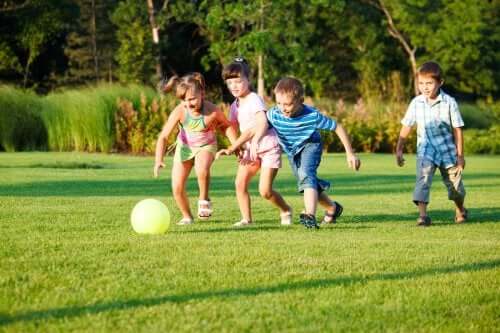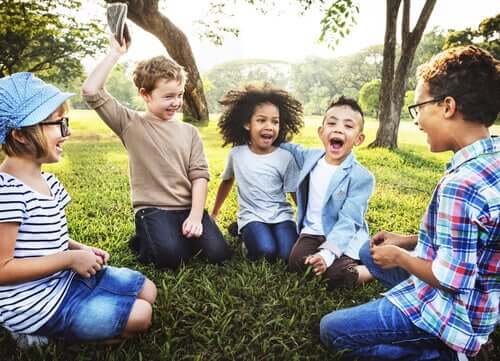Socialization in Children: 4 Key Concepts


Written and verified by the psychologist María Alejandra Castro Arbeláez
Human beings are social by nature. We live in communities and constantly interact with others. In fact, we begin learning to live with other people at a very young age. But this isn’t always easy. For this reason, we present an article focusing on some of the most important keys to the proper socialization in children.
It’s important to keep in mind that a child’s first experiences with socialization occur in the family. Above all, these can help determine the ways in which the child will go on to interact with the world.
“Emotional intelligence begins to develop in the earliest years. All the small exchanges children have with their parents, teachers, and with each other carry emotional messages.”
– Daniel Goleman –
What is socialization?
Socialization is a continuous learning process through which we acquire a series of skills in order to optimally interact with different people in different contexts.
We progressively internalize the norms of behavior that our culture considers correct. Little by little, we shape our personalities and identities, since each individual has their own set of characteristics and way of expressing themselves.
“The more social intelligence you have, the happier and stronger you’ll be. You’ll also have better personal relationships.”
– Daniel Goleman –
The importance of improving socialization in children
It’s very important to teach social skills from childhood onward. Children should learn as early as possible the positive behaviors that will help them develop properly and respond appropriately to different situations.
Furthermore, this will give the children sufficient resources to deal with changes, resolve conflicts, overcome shyness, work in teams, and establish healthy friendships.
To this end, socialization helps prevent possible problems that can occur in people’s lives.

Important players in a child’s socialization
Children are a reflection of what they see around them. In other words, it can be said that there are several important players that impact their socialization:
- Their families
- The people nearest to them in their environment (friends, neighbors, etc.)
- Their schools
- The media
The family is the most important factor in a child’s socialization. The mother and father need to establish a secure attachment style with their child. To this end, they need to teach the child in an environment founded on communication, respect, and peace. As a result, the home becomes a source of values indispensable to their social development.
4 keys to improving socialization in children
Self-esteem
The concept of self-esteem refers to a person’s perception of oneself. Being aware of our personal characteristics is an essential quality when it comes to accepting ourselves and correcting the behaviors we believe we can improve.
We need to raise self-confident children with a healthy sense of self-esteem. Moreover, love and self-esteem are vital to being able to express oneself without fearing the attendant emotions, feelings, and thoughts.
This is all closely related to socialization. If children can know and understand themselves, they can develop the ability to understand the intentions, motivations, and desires of others.
“Only the person who has faith in himself is able to be faithful to others.”
– Erich Fromm –
Learning values
Children need to grow up learning solid and positive values. There are two in particular that are essential to acquiring proper social skills.
- Assertiveness. This is the ability to respectfully and firmly express your own ideas, feelings, and thoughts. It’s about saying things clearly without upsetting others, avoiding both aggression and passivity.
- Empathy. The ability to see things from another’s perspective, understand their feelings, and respond effectively. In other words, it means recognizing and interpreting others’ emotions and sharing these emotional states.
“Empathy and social skills are social intelligence, the interpersonal part of emotional intelligence. That’s why they look alike.”
– Daniel Goleman –
Communication
Communication is the foundation of all healthy relationships. This is why parents should have to be open to dialogue and reflection. Moreover, it’s an important part of explaining social norms, rules, and values to children.
In addition, it’s necessary to encourage active listening. Communication should not only focus on expressing what one thinks, but also taking into account the other person’s impressions. This is absolutely essential to being able to understand and socialize with different kinds of people.

Social play
Children must grow accustomed to playing in social settings. In other words, parents need to provide contexts in which they can have fun while relating to other kids. This way, they learn early on how to interact with their peers while adopting social values like cooperation, friendship, and generosity.
In short, social play is a perfect way to encourage socialization in childhood.
In conclusion…
To sum up, improving socialization in children requires providing an education based on love, attention, and understanding. This will allow them to successfully develop the emotional intelligence and social skills needed to interact with others.
“What really matters for success, character, happiness, and lifelong achievement is a definite set of emotional skills – your EQ – not just purely cognitive abilities that are measured by conventional IQ tests.”
– Daniel Goleman –
Human beings are social by nature. We live in communities and constantly interact with others. In fact, we begin learning to live with other people at a very young age. But this isn’t always easy. For this reason, we present an article focusing on some of the most important keys to the proper socialization in children.
It’s important to keep in mind that a child’s first experiences with socialization occur in the family. Above all, these can help determine the ways in which the child will go on to interact with the world.
“Emotional intelligence begins to develop in the earliest years. All the small exchanges children have with their parents, teachers, and with each other carry emotional messages.”
– Daniel Goleman –
What is socialization?
Socialization is a continuous learning process through which we acquire a series of skills in order to optimally interact with different people in different contexts.
We progressively internalize the norms of behavior that our culture considers correct. Little by little, we shape our personalities and identities, since each individual has their own set of characteristics and way of expressing themselves.
“The more social intelligence you have, the happier and stronger you’ll be. You’ll also have better personal relationships.”
– Daniel Goleman –
The importance of improving socialization in children
It’s very important to teach social skills from childhood onward. Children should learn as early as possible the positive behaviors that will help them develop properly and respond appropriately to different situations.
Furthermore, this will give the children sufficient resources to deal with changes, resolve conflicts, overcome shyness, work in teams, and establish healthy friendships.
To this end, socialization helps prevent possible problems that can occur in people’s lives.

Important players in a child’s socialization
Children are a reflection of what they see around them. In other words, it can be said that there are several important players that impact their socialization:
- Their families
- The people nearest to them in their environment (friends, neighbors, etc.)
- Their schools
- The media
The family is the most important factor in a child’s socialization. The mother and father need to establish a secure attachment style with their child. To this end, they need to teach the child in an environment founded on communication, respect, and peace. As a result, the home becomes a source of values indispensable to their social development.
4 keys to improving socialization in children
Self-esteem
The concept of self-esteem refers to a person’s perception of oneself. Being aware of our personal characteristics is an essential quality when it comes to accepting ourselves and correcting the behaviors we believe we can improve.
We need to raise self-confident children with a healthy sense of self-esteem. Moreover, love and self-esteem are vital to being able to express oneself without fearing the attendant emotions, feelings, and thoughts.
This is all closely related to socialization. If children can know and understand themselves, they can develop the ability to understand the intentions, motivations, and desires of others.
“Only the person who has faith in himself is able to be faithful to others.”
– Erich Fromm –
Learning values
Children need to grow up learning solid and positive values. There are two in particular that are essential to acquiring proper social skills.
- Assertiveness. This is the ability to respectfully and firmly express your own ideas, feelings, and thoughts. It’s about saying things clearly without upsetting others, avoiding both aggression and passivity.
- Empathy. The ability to see things from another’s perspective, understand their feelings, and respond effectively. In other words, it means recognizing and interpreting others’ emotions and sharing these emotional states.
“Empathy and social skills are social intelligence, the interpersonal part of emotional intelligence. That’s why they look alike.”
– Daniel Goleman –
Communication
Communication is the foundation of all healthy relationships. This is why parents should have to be open to dialogue and reflection. Moreover, it’s an important part of explaining social norms, rules, and values to children.
In addition, it’s necessary to encourage active listening. Communication should not only focus on expressing what one thinks, but also taking into account the other person’s impressions. This is absolutely essential to being able to understand and socialize with different kinds of people.

Social play
Children must grow accustomed to playing in social settings. In other words, parents need to provide contexts in which they can have fun while relating to other kids. This way, they learn early on how to interact with their peers while adopting social values like cooperation, friendship, and generosity.
In short, social play is a perfect way to encourage socialization in childhood.
In conclusion…
To sum up, improving socialization in children requires providing an education based on love, attention, and understanding. This will allow them to successfully develop the emotional intelligence and social skills needed to interact with others.
“What really matters for success, character, happiness, and lifelong achievement is a definite set of emotional skills – your EQ – not just purely cognitive abilities that are measured by conventional IQ tests.”
– Daniel Goleman –
All cited sources were thoroughly reviewed by our team to ensure their quality, reliability, currency, and validity. The bibliography of this article was considered reliable and of academic or scientific accuracy.
- Gutiérrez-Corredor, A. B. (2010). Cómo favorecer el desarrollo social en los niños y niñas. Innovación y Experiencias Educativas, (35).
- Jiménez-Ruíz, S. M. (2009). La socialización en la familia y la educación en valores. Revista digital para profesionales de la enseñanza, (4).
This text is provided for informational purposes only and does not replace consultation with a professional. If in doubt, consult your specialist.








